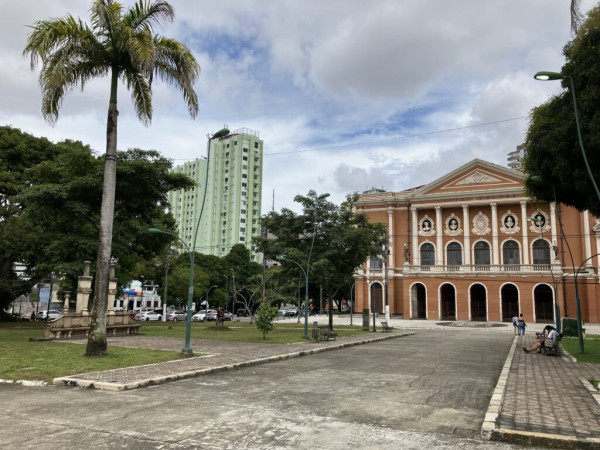Macron bets on investments and fraternité to charm Lula in first visit to Brazil
BELÉM, Brazil — “You can do business without necessarily having trade agreements,” French President Emmanuel Macron told reporters bombarding him with questions on why he so adamantly opposes an EU trade deal with Brazil and other South American countries.
As he lands in Brazil on Tuesday, he will try to prove that point, and convince Brazilian President Luiz Inácio Lula da Silva that investment deals are the best way to show the strength of their countries’ ties.
While Macron, a business-friendly investment banker and product of France’s elite education system, may not have much in common with Lula, a metalworker who rose through the trade union movement and lost a finger in a machinery accident, the trip is one the Frenchman will be keen to make work.
In his first official visit to a South American country, Macron wants to make up for the time lost during the far-right Jair Bolsonaro presidency, “a four-year eclipse and a virtual freeze in political relations between our two countries,” as an Elysée official put it.
He now wants to go big and boost French investments in Brazil, especially in the green sector, and will be joined by around 120 representatives of French businesses, including not only the CEOs of heavyweights like Carrefour and Airbus, but also of green startups.
Lula and Macron will first meet on Tuesday in Belém, a tropical metropolis which epitomizes Brazil’s ambition to become a green superpower, and not only an export powerhouse.
A trade hub during the 19th century rubber boom, when rubber barons built an opera house inspired by Milan’s La Scala, Belém has suffered from the ups and downs that have since hit rubber, sugar and coffee. Lula wants to show that those times are over and turn Belém into the capital of Brazil’s green transition, by hosting the COP30 climate conference here next year.
The meeting in Belém comes after Macron, in a bid to appease angry French farmers, spent months slamming Brazilian beef exports and opposing a controversial trade deal between the EU and the Mercosur bloc, of which Brazil is the largest member. The message didn’t go unnoticed in Brazil, where Lula has pointed to Macron’s protectionism as the main obstacle to the deal.
For the French, the deal will almost be a taboo word during the three-day trip. “The topic is not meant to be discussed during a bilateral visit,” as an Elysée official put it ahead of the trip.
However, “it is going to be the elephant in the room,” according to a diplomat from one Mercosur country, who was not authorized to speak publicly on the matter but predicted that the file would inevitably come up in discussions between Macron and Lula.
During the visit, which includes a stop in Sao Paulo for a meeting with business executives and the state visit protocol in Brasília, Macron will focus on new bilateral projects and will announce new investments by French companies in Brazil.
France, already a top investor in Brazil — with a cumulative €40 billion in foreign direct investment is also the biggest foreign employer — and is expanding its economic footprint. Carmaker Stellantis this month pledged to invest €5.6 billion in the country, an example of the latest dealmaking between the two nations.

But if Macron wants to compete with top players like China, which is boosting investments in Brazilian energy, he will need to offer “not just declarations of intent, but hard cash,” said Gaspard Estrada, a political scientist and expert on Latin America at Sciences Po Paris.
The trip will also provide Macron and Lula with an opportunity to showcase defense cooperation. Brazil has already built two military submarines for its navy using technology transferred by France’s NavalGroup. On Wednesday, Macron and Lula will visit the third one at the naval base of Itaguaí, near Rio de Janeiro.
Mas que nada
Things were complicated with Bolsonaro, but that doesn’t mean they will be easy with Lula. The French and Brazilian presidents are at odds on key files including the wars in Ukraine and Gaza.
While Macron has stepped up support for Ukraine, to the point of envisaging sending troops, Lula has pledged to stay neutral in the conflict. Lula has also taken a harder stance against Israel, denouncing the humanitarian crisis in Gaza as genocide, something France and its Western allies disagree with.
But Macron also wants to present France as an influential ally on international economic negotiations such as fairer international taxation, the reform of the World Bank and the International Monetary Fund, where developing countries like Brazil feel underrepresented.
Fighting inequalities, including by taxing the richest, is at the top of the agenda for Brazil, which is chairing the G20 this year, and Macron wants to show he is on Lula’s side before he returns to Brazil in November for a G20 summit in Rio de Janeiro.
He already conveyed that message when he met Lula in Paris in June last year, on the sidelines of a Summit for a New Global Financial Pact. Another signal came last month, when Finance Minister Bruno Le Maire backed Brazil’s proposal for a single global tax for the richest at a meeting of G20 finance ministers in Rio.
For Estrada, the Latin America expert, “Macron and Lula have a vision of the world that is not necessarily the same, but they are each taking steps towards each other.”
Camille Gijs contributed reporting from Brussels.